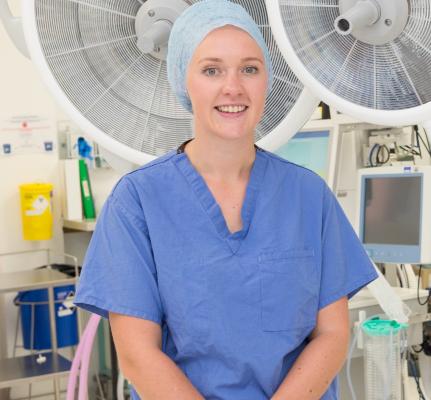Operating department practitioner
Operating department practitioners play a major role in each phase of a person’s operation.
Working life
You’ll provide high standards of skilled care and support during each phase of a patient’s perioperative care - anaesthetic, surgery and recovery.
You’ll work in the surgery team and manage the preparation of the operating theatres. You'll also be the the link between the surgical team and other parts of the operating theatre and hospital.
You’ll have an important role in three of the phases of perioperative care:
Anaesthetic
You’ll:
- help and support patients before surgery
- prepare a wide range of specialist equipment and drugs, including anaesthetic machines, intravenous equipment and devices that safely secure the patient's airway during anaesthesia
Surgery
You’ll play an important part of the surgery team by:
- preparing all the necessary instruments and equipment for surgery, including microscopes, lasers and endoscopes
- providing the correct surgical instruments and materials to the surgeon
- being responsible for all surgical instruments, equipment and swabs during the operation
- acting as a link between the surgical team and other parts of the theatre and hospital
- anticipating the requirements of the surgical team and responding effectively
Recovery
You’ll:
- support and monitor the patient on their arrival into the recovery unit
- provide appropriate treatment until they have recovered from the effects of the anaesthesia and/or surgery
- assess the patient so they can be discharged back to a ward
Jordan Faithwaite
ODP professional development practitioner
The commitment is massive; however, it is hugely rewarding – you can instantly see the difference you make each day.

Entry requirements
You’ll need to study for a degree in operating department practice at university. You will usually need a minimum of five GCSEs at grades 4-9/A-C or equivalent plus A-level or equivalent qualifications such as a T level. These will vary depending on the university so check with the universities you are considering applying to. Once you’ve completed your degree, you need to register with the Health and Care Professions Council (HCPC) before you can start practising. The other option is to apply for an apprenticeship degree.
Annual payments
If you're eligible, you’ll receive at least £5,000 a year to help fund your studies while at university. Your personal circumstances may mean you could receive more. And the good news? You'll never have to pay it back. Find out more.
Degree apprenticeship
A degree apprenticeship is another way to become an ODP. Apprenticeships give you the chance to earn a living while gaining your qualification. Your employer and the government will pay the tuition fees, so apprenticeships aren’t eligible for student grants.
Must-have skills
Don’t forget – academic qualifications aren’t everything. You’ll need to have strong communication skills and be as comfortable discussing treatment plans with patients as you are with your professional peers. You’ll also need to be safety-conscious and have excellent observational skills.
Where being an ODP can take you
Once you’ve qualified, you’ll have annual Continuing Professional Development (CPD) check-ins, where we’ll discuss your career aspirations and plan how we can help you to achieve them, so you’re always moving forward.
There are several routes you could take to further your career including management, education and clinical research. You could also undertake further training to become a surgical care practitioner, anaesthesia associate or advanced critical care practitioner.
Pay and benefits
Your standard working week will be around 37.5 hours with the need to work flexibly over a seven day period. As an ODP, you’ll be paid on the Agenda for Change (AFC) pay system, typically starting on band 5.
You’ll also have access to our generous pension scheme and health service discounts, as well as 27 days of annual leave plus bank holidays.
Displaying 1 - 5 of 34 matches
-
Operating Department Practice
Birmingham City University
View courseOpens in a new window
- Qualification
- Bachelor of Science (with Honours) - BSc (Hons)
- Study mode
- Full-time
- Duration of the course
- 3 Years
- Leading to a career in
- Operating department practice
- Contact details
- [email protected] 0121 331 6295
- Region
- South West
- Admissions address
- Barrack Road Exeter EX2 5DW
Devon
EX2 5DW
United Kingdom
-
Operating Department Practitioner
Truro and Penwith College
View courseOpens in a new window
- Qualification
- Bachelor of Science (with Honours) - BSc (Hons)
- Study mode
- Full-time
- Duration of the course
- 3 Years
- Leading to a career in
- Operating department practice
- Contact details
- [email protected] 01872 305746
- Region
- South West
- Admissions address
- Truro College
College Road
Truro
TR1 3XX
United Kingdom
-
Operating Department Practice
Buckinghamshire New University
View courseOpens in a new window
- Qualification
- Bachelor of Science - BSc
- Study mode
- Full-time
- Duration of the course
- 3 Years
- Leading to a career in
- Operating department practice
- Contact details
- [email protected]
- Region
- South East
- Admissions address
- Queen Alexandra Road
High Wycombe
HP11 2JZ
United Kingdom
-
Operating Department Practice
London South Bank University
View courseOpens in a new window
- Qualification
- Bachelor of Science (with Honours) - BSc (Hons)
- Study mode
- Full-time
- Duration of the course
- 3 Years
- Leading to a career in
- Operating department practice
- Contact details
- [email protected] 0207 815 7500
- Region
- London
- Admissions address
- 103 Borough Road
London
SE1 0AA
United Kingdom
-
Operating Department Practice
University of Bedfordshire
View courseOpens in a new window
- Qualification
- Bachelor of Science (with Honours) - BSc (Hons)
- Study mode
- Full-time
- Duration of the course
- 3 Years
- Leading to a career in
- Operating department practice
- Contact details
- [email protected] 0300 3300 073
- Region
- East of England
- Admissions address
- Park Square
Luton
LU1 3JU
England




